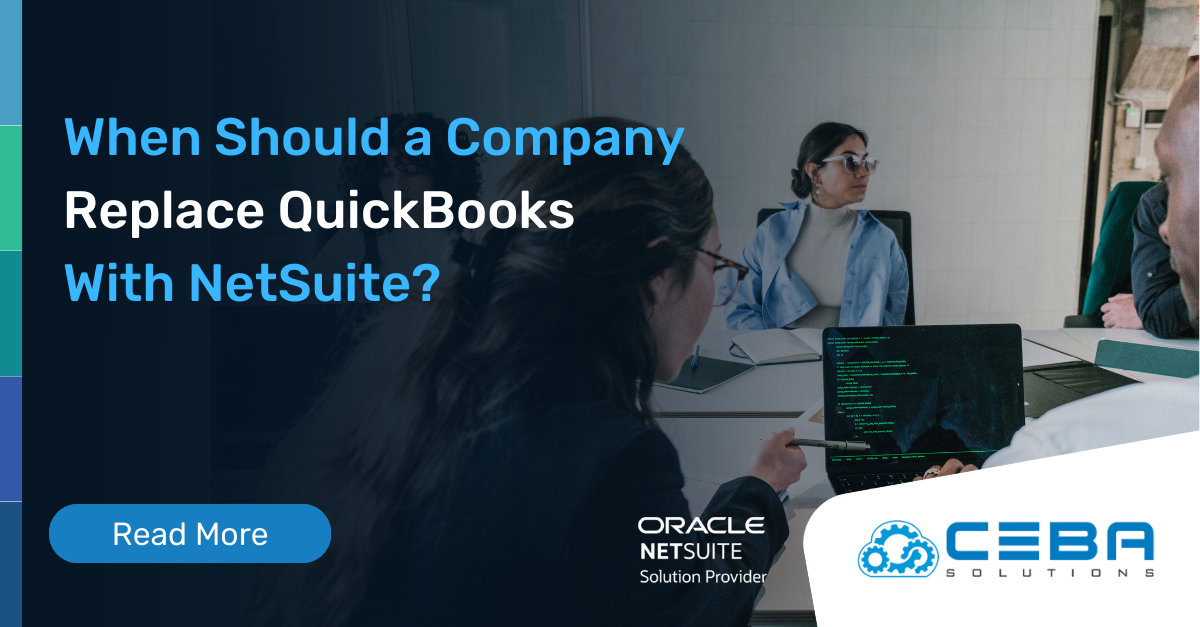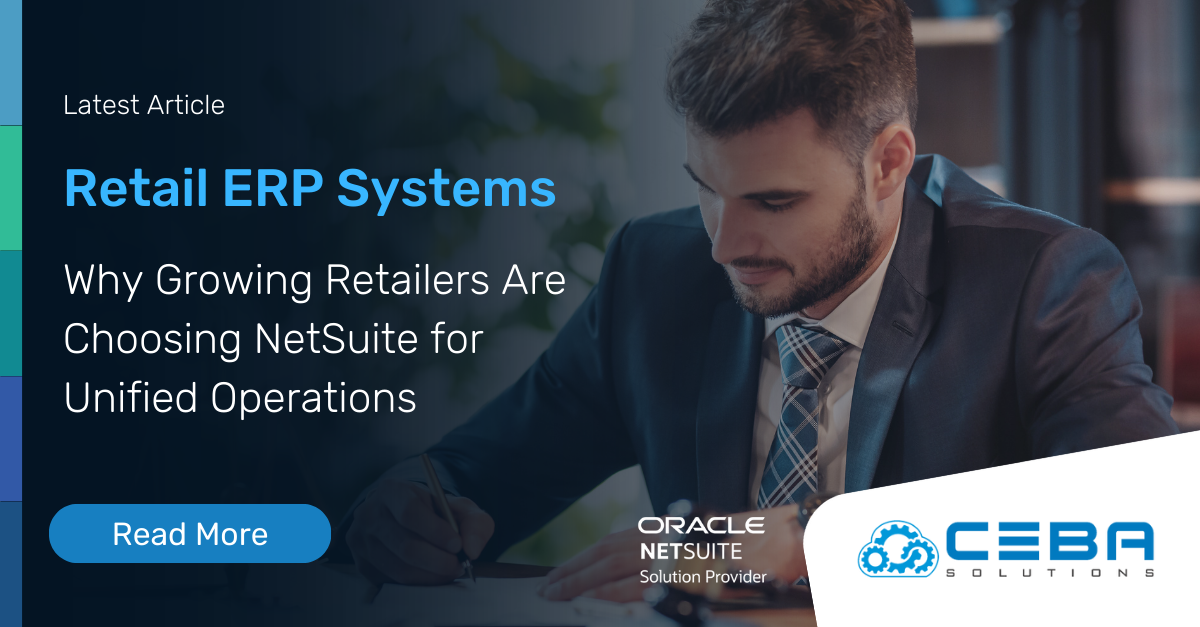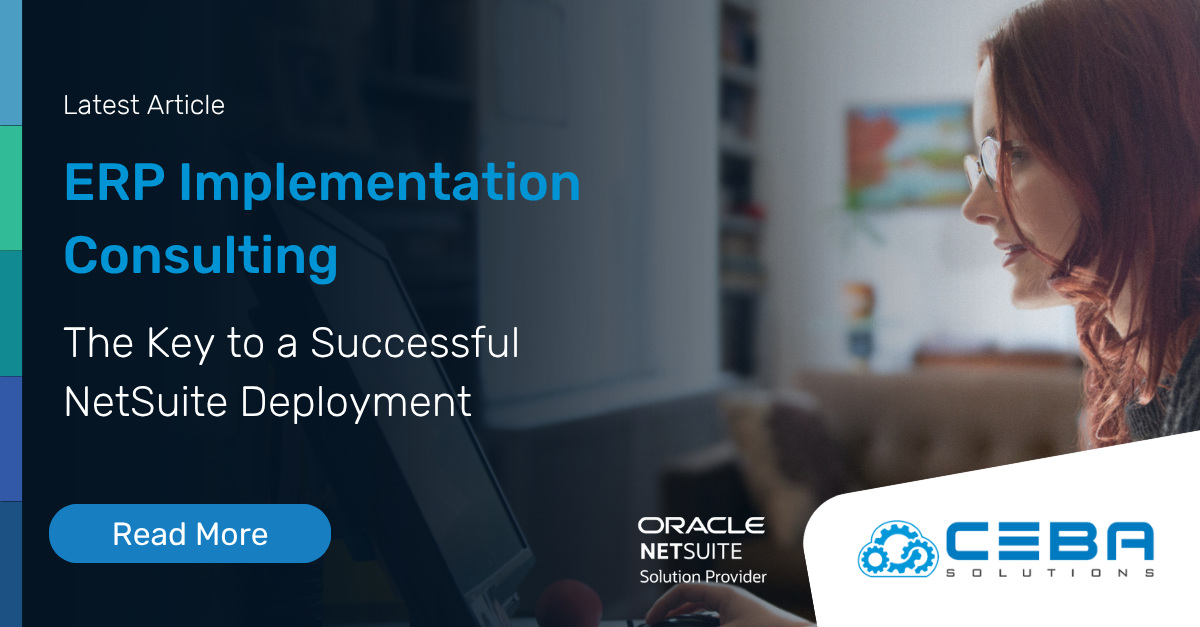.png)
Deep Dive: How the NetSuite Procure to Pay Solution Streamlines Your Business's Supply Chain
Deep Dive: How the NetSuite Procure to Pay Solution Streamlines Your Business's Supply Chain
Supply chain management is an integral aspect of any business. With the advent of cloud-based solutions like NetSuite, businesses can achieve end-to-end visibility and control in their supply chain, and NetSuite's Procure to Pay is at the forefront of this revolution.
NetSuite's Procure to Pay (P2P) cloud based solution is helping businesses worldwide use to streamline their supply chain operations. This comprehensive solution helps them maintain full visibility and control over their entire supply chain cycle, placing them in a stronger competitive position.
Overview of NetSuite Procurement to Pay
NetSuite's P2P is an all-encompassing solution designed to seamlessly manage the entire lifecycle of procurement and payment processes. Its applications range from sourcing goods and services, creating and managing purchase orders, accurately receiving and matching invoices and orders, to efficiently handling payments. NetSuite P2P revolutionizes these complex procedures, increasing efficiency and control for businesses.
A Look into NetSuite's Procure-to-Pay System
The procure-to-pay process aims to offer enhanced control and transparency across the entire transaction journey. This process interacts with several users across different departments including purchasing, manufacturing, and accounting. However, many businesses are still relying on siloed inventory management software and accounting software integrations or worse, manual handling of the P2P cycle which can result in unnecessary complications such as delayed or duplicated payments, unauthorized payments, documentation inaccuracies, and other inefficiencies. NetSuite addresses these challenges by automating and streamlining manual steps within the P2P process.
Breaking Down the 7 Core Features of NetSuite's Procure-to-Pay: From Purchase Request to Payment of Vendor Bills

Purchase Requisition
A purchase requisition, also known as a procurement requisition, is an electronic document that is created by an employee who identifies a need for specific goods or services. The preparation of a purchase requisition does not imply the finality of a purchase but rather initiates the purchasing process by seeking internal approval, which means it is a non-GL impacting transaction.
Once the purchase request is completed, the purchasing manager or the relevant personnel is alerted about the order request. This internal document provides critical information necessary for finalizing the approvals for a purchase such as product description, reason for the request being made, quantity, vendor details, price, and the details of the requesting party.
PO Creation
As implied by its name, a purchase order (PO) comprises the specifics of an impending purchase. Once the purchase requisition receives approval, the approved purchase requisition is turned into an open purchase order, ready for sending to the supplier via their preferred method, which can be defaulted at the supplier record level.
The purchase order serves as a formal request to process your order and send instructions for payment. NetSuite supports many different types of purchase orders including blanket purchase orders, release orders, and scheduled orders. Upon the final approval from both the buyer and the vendor, the purchase order transforms into a legally binding document, carrying all the necessary details the vendor requires to complete the order and meet the company's stipulations.
"NetSuite's Procure-to-Pay process empowers businesses to automate vendor-related procedures, boosting efficiency and enhancing control across the entire transaction journey." - Zabe Siddique
Item Receipt
The item receipt or delivery docket provides detailed information such as items ordered, quantities, and arrival times, and should match the purchase order if a variation has not been recorded in advance. It indicates the status of the item—received or not received, as well as any reason an item has not been sent, such as unavailability—and also provides data about the received items' entry into the warehouse such as the team member who received the order.
Automatic AP Approvals with Three Way Match
NetSuite supports automatic AP approvals with a three way matching, which is an essential part of streamlining your supply chain and accounts payable administration. The system allows you to automatically approve Accounts Payable (AP) invoices that have been matched with pre-negotiated contract terms as well as purchase orders and receipts, eliminating the manual review process. The three way match ensures that all three documents align for accuracy, providing a level of oversight that ensures accuracy throughout the entire process.
Supplier Bill Payment
Upon receipt of the approved invoice or vendor bill (vendor invoice) from the supplier, the finance team initiates the payment process in accordance with the contract stipulations and payment terms. It is incumbent on the purchasing company to verify that the payment details are accurate and take precautions to safeguard against potential accounts payable fraud.

Deep Dive: How the NetSuite Procure to Pay Solution Streamlines Your Business's Supply Chain
Download Here!
Vendor Return Authorization
This is a non-posting transaction that tracks a return to a vendor. It includes the items to be returned, their quantities, approval status, shipment status, and the refundable amount or credit from the vendor. This type of transaction is available when the Vendor Return Authorizations feature is activated in NetSuite.
The vendor return process is a four-step procedure: creating a vendor return authorization record, approving or canceling the authorization, shipping the authorized return items, and crediting an authorized vendor return. This can all be managed through NetSuite's vendor portal, which is free for all users.
Vendor Credit
A vendor credit transaction establishes a credit from a vendor, which can be applied to a payable account. For example, a vendor credit transaction might occur when items are returned to a vendor or a discount is negotiated with a vendor.
By harnessing the power of these seven core features within NetSuite's Procure to Pay process, businesses can automate and streamline their vendor-related procedures, thus increasing overall efficiency and accuracy.
NetSuite Procure to Pay Report Suite
A/P Aging • A/P Register • A/P Payment History by Bill • A/P Payment History by Payment • Open Bills • Purchase by Vendor • Purchase by Item • Purchase Order Register • Open Purchase Orders • Purchase Order History
Business Benefits of NetSuite Procure to Pay Key Features
NetSuite P2P is built with a suite of features and functionalities that simplify and streamline business operations, making it a reliable tool for supply chain management.
Centralized Supplier and Vendor Management
NetSuite P2P centralizes vendor management, making it easier for businesses to handle vendor information, track performance, and manage contracts. A unified system for managing vendors saves time, reduces errors, and promotes a more productive relationship with suppliers.
Robust Spending Policy Management
With NetSuite's procurement capabilities, businesses can automate their purchase order processes to align with their spending policies. It enables creation, approval, and dispatch of purchase orders, accelerating the entire procurement process while eliminating the likelihood of errors associated with manual data entry and ensuring adherence to your businesses spending policies.
Streamlined Inbound Goods Receiving Process
NetSuite Procure to Pay leading practices streamlines the receiving process by allowing warehouse and procurement teams to manage delivery schedules, automatically updating inventory levels and alerting the appropriate personnel when goods are received, as well as the option to receive notifications of upcoming orders ahead of time. It ensures that the right products are received in the correct quantity and condition, reducing the chances of order discrepancies and disputes with suppliers after a delivery has been accepted.
Automation of Matching and Payment Processing
NetSuite's Procurement platform ensures efficient invoice matching and payment processing. By automatically capturing invoices, creating approval routings, and matching them with corresponding orders and receipts, it simplifies the accounts payable process. It provides businesses with complete control over their cash flow, improves supplier relationships, and prevents potential fraud.
Increased Collaboration with NetSuite's Vendor Portal
NetSuite's allows you to extend your vendors access to an online Portal which helps businesses to streamline their procure to pay process by increasing collaboration with vendors. With the Vendor Portal, vendors have access to all purchase orders that are sent out to them and can easily view order information without having to contact buyers or check separate systems. This allows for faster communication between buyers and vendors because they can quickly see what is requested and when it needs to be delivered.
Detailed Procurement Dashboards, Reports and Spend Analytics
NetSuite P2P doesn't just facilitate the procurement and supplier payment process; it also provides businesses with the ability to customize the vendor record to facilitate more detailed reporting and spending analytics capabilities that align to your business requirements. Through simple pre-installed procurement dashboards, it enables proactive tracking of real-time information through KPI widgets and vendor scorecard portlets, giving businesses insight into their procurement processes and vendor performance.
Better Management of Supplier Relationships
NetSuite P2P plays a critical role in managing and nurturing relationships with suppliers. By providing supplier performance metrics and channels for feedback, businesses can build stronger, more reliable partnerships. This level of understanding and communication ensures a steady supply of high-quality products, enhancing the business's overall performance and customer satisfaction.
"NetSuite's P2P tool streamlines supplier management and procurement, offering real-time inventory visibility, enhanced vendor collaboration, and robust audits for increased control and performance." - Zabe Suddique
Advanced Inventory Management
With NetSuite P2P, businesses can achieve real-time visibility into their inventory across multiple locations. This capability helps to ensure optimal inventory levels and prevent overstocking or understocking. It also reduces the likelihood of excess, obsolete, or out-of-stock inventory, mitigating the risk of lost sales and waste.
Automated Invoice and Vendor Payment Processing
One of the critical features of NetSuite P2P is its ability to automate vendor payments through the generation and upload of a bank payment file, based on approvals in the system. This streamlining results in improved cash flow management, better vendor relationships, and reduced potential for fraud. By automating these tasks, businesses can allocate more resources to other critical areas, driving growth and profitability.
Spend Policy Compliance and Real-Time Reporting
In an increasingly regulated business environment, maintaining compliance with both internal controls and external regulatory requirements is crucial. NetSuite P2P enforces compliance through its robust audit trail capabilities, reducing the risk of penalties and damage to your reputation. Furthermore, its comprehensive reporting provides the procurement department with the insights needed to make informed, strategic decisions.
Interested in Harnessing The Power of NetSuite P2P to Streamlining Your Supply Chain?
For any product based business, an efficient and effective supply chain is more than just a strategic advantage—it's a competitive necessity. With NetSuite's Procure to Pay, businesses can stay ahead of the curve, ensuring they maintain control, visibility, and agility in their supply chain operations.
This detailed examination has hopefully highlighted how NetSuite P2P can transform your supply chain, optimizing operations and propelling your business towards greater success. While each organization's specific needs may vary, the benefits of a streamlined, efficient, and effective supply chain are universal.
By leveraging NetSuite P2P, your business can enjoy these benefits, taking a significant step towards achieving a competitive edge in today's fast-paced market.










